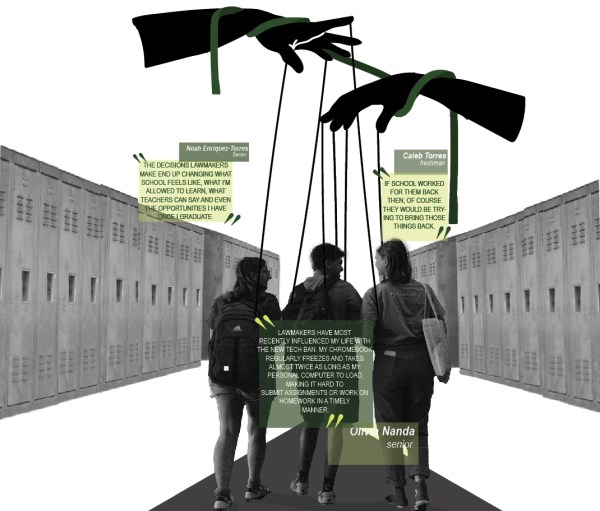Holiday season brings joy to students

Hannukah
Hanukkah is a Jewish holiday celebrated in late November to late December for eight days. The name of this holiday is taken from the Hebrew word that means to dedicate; it is during this Festival of Lights that the people of Jewish faith honor the re-dedication of the miracle of the oil.
According to the Talmud, or Jewish civil and ceremonial law, the leaders of a Jewish rebel army, the Maccabees reached the Temple but could only find one oil jug with the high priest’s seal intact. The jug only contained enough oil to last one day, but in what can only be described as a miracle, the oil lasted for eight days.
This miracle is celebrated through the traditions of Hanukkah; these traditions include the lighting of the menorah. The menorah holds nine candles, eight of which are for the eight days that the oil burned and the ninth in the center called the Shamash is used to light the rest of the candles.
For sophomore Brandon Crawford celebrating Hanukkah with his family and carrying on their traditions is the most important thing about the holiday.
“My favorite tradition is going to my aunts house in Dallas during thanksgiving break to celebrate Hanukkah with her and our family; we then celebrate again when at home when Hanukkah starts,” Crawford said.
This year Hanukkah fell on the same day as Thanksgiving; according www.dallasnews.com this will not occur again until the year 2070 and then again in the year 2165. It is estimated that this will not occur again for thousands of years.
Junior Megan Schwab makes latkes with applesauce and hands out presents every Hanukkah with her family. These traditions are a way to keep their heritage and customs alive.
“Hanukkah is special for me because I get to be with my family; we laugh, eat, and just have fun together,” Schwab said. “The story of Hanukkah itself is kind of a reminder to me to always persevere.”
by Co-Entertainment Editor Blaine MacMorran
Eid
Christmas and Hanukkah are well known holidays. Most people don’t know about the Muslim holiday, Eid.
“Eid brings me closer to my Muslim culture and closer to my family,” sophomore Lina Barakat said. “Eid for me is about spending time with family and friends and helping the less fortunate.”
The Prophet Muhammad used to give children sweets as presents. Muslims today follow his footsteps by giving out presents.
“We have a white elephant every year to get our presents on Eid,” freshman Rameen Haroon said. “The biggest tradition we have is making a sweet pudding called Sheer Korma and it is basically like a rice pudding with noodles instead of rice. We spend the whole day before Eid making Sheer Korma. We have it with lunch on the day of Eid and also give it out to friends and family.”
Some people like to help the unfortunate with donations.
“Our family helps out families who cant afford to buy meat so we sacrifice a goat to give the less fortunate to eat meat,” Barakat said.
Not for everyone it’s about the gifts, clothing, and food, its also about family and friends.
“For me Eid is about hanging out with friends and family. If I don’t get presents I will survive, the same with clothing and good food. I can survive with jeans and a t-shirt and some rice for clothing and food but I don’t think I could survive a day with out my family and friends. My family and friends are my world.” Haroon said.
There are many more family traditions and this one involves baking.
“The whole day before Eid my family bakes these shortbread cookies with dates in them and we eat them for breakfast on Eid before we go to pray,” Barakat said. “They taste so good after all that intense cookie labor.”
by Staff Writer Fuaad Ajaz
Christmas
Senior Kari Schulze beautifies her family’s home with Christmas lights, stockings, and other holiday decorations during the first week of December every year.
“Every family member is in charge of putting up their sentimental ornaments,” Schulze said. “Ornaments that we have either made or gotten in the past years.
Trees and plants that remain green all year had a special meaning for people during winter long before the creation of Christianity according to “History of Christmas Trees” on History.com.
The first record of a tree being displayed was in the 1830’s when Germans settled in Pennsylvania, and have been credited for starting the Christmas tree tradition. The tree was first seen as a “pagan symbol” according to the article, but after Queen Victoria and her German Prince, Albert, were sketched in London News standing with their children around a Christmas tree in 1846, it was turned into a fashionable symbol.
By 1890’s Christmas ornaments had arrived from Germany and the popularity of Christmas trees raised around the United States.
With many ornaments to hang on a tree, senior Lindsey Sageser and her family participates in the German Christmas pickle ornament tradition.
“Every year my mom hides a pickle ornament inside the tree, deep in the branches,” Sageser said. “The person that finds the ornament on Christmas day gets an extra gift. I find the ornament every year. Last year I got a $50 gift card and a chocolate bar.”
Some students spend days before Christmas with their extended family by playing games, cooking, or other activities together. Senior Nadia Bayoumi spends the few days before Christmas baking her grandmother’s old recipes, consisting of cakes and cookies, for family friends.
“The first year we tried to make my grandmother’s cookies we used the wrong kind of butter,” Bayoumi said. “The first batch came out really soft so we put them back in the oven to harden more. We put the cookies in way too long and they came out black and hard.”
While some students have traditions with family, Bayoumi and Schulze started exchanging pajama pants as Christmas presents during their sixth grade year at Bailey Middle School.
“Last year we both got each other the wrong sized pajama pants,” Bayoumi said. “I accidently gave her a medium instead of a small and she got me an extra large instead of a small.”
Americans have a custom of giving and receiving presents on Christmas to remind others of the presents Jesus received from the Wise Men according to whychristmas.com.
Schulze has a tradition of having two white elephant gift exchanges, one with good presents and one with bad presents.
“When I was in the fourth grade, I got a box of rocks from the bad white elephant gift exchange,” Schulze said. “I was pretty disappointed because I thought it was going to be a big doll.”
Bayoumi enjoys the feelings of anticipation and excitement Christmas brings.
“It is so much fun to see the faces of my friends and family as they open their presents,” Bayoumi said.
by In-Depth Editor Nancy Tran
Your donation will support the student journalists of James Bowie High School. Your contribution will help cover our annual website hosting costs. Any contributions made through this service are NOT tax deductible. If you would like to make a tax deductible donation OR to subscribe to our print edition, please contact us at [email protected].





